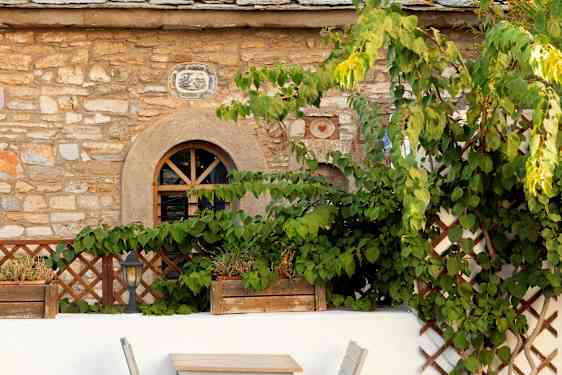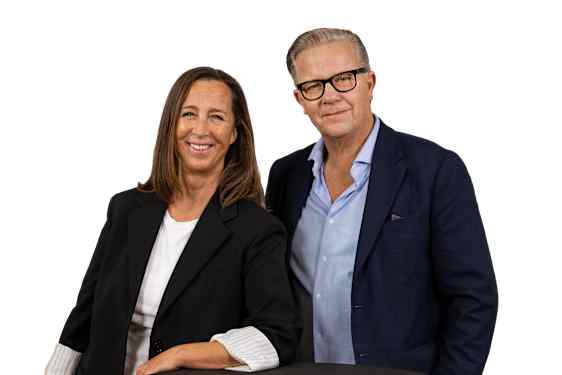A conversation with...
Magnus Wikner, CEO of Nordic Leisure Travel Group, and Camilla Malmose, Head of Strategy and ESG

What are the main sustainability dilemmas facing the tourist industry today?
Magnus: The biggest dilemma by far is striking the balance between the importance of the industry from a socio-economic perspective and the impact it has on the climate and the environment. According to the World Travel & Tourism Council, the travel and tourism sector is responsible for 10% of all jobs. This makes tourism essential for millions of people around the world.
We can see the positive impact we have in our home markets and the destinations we travel to. But, at the same time, we acknowledge that tourism has an environmental cost, especially when it comes to carbon emissions from air travel.
Camilla: We had our scope 1, 2 and 3 emission targets validated by the Science Based Targets initiative (SBTi) in the fall of 2024. It was a huge task, but a massively important one. It confirmed that we are on the right track, that our targets are realistic, and that it’s possible for us to grow as a company – to continue to create jobs and wellbeing in the communities where we operate – while reducing our emissions to comply with the 1.5°C ceiling stipulated in the Paris Agreement. Another kind of social and environmental impact that we, as a travel company, have an obligation to address is ‘over tourism’.
This is an issue that has received much media attention, and for good reason. In the past, the tourist industry had a tendency to exploit destinations commercially, without a clear understanding of the socio-economic impact on the community. But we learnt from these mistakes and changed our approach. Now it seems that some of the new tourism models are repeating the mistake. In these cases, it’s important that the industry works closely with local authorities and tourist boards to really ensure that tourism has a positive impact on a destination.
You have a clearly defined sustainability strategy. How does it relate to your company vision?
Camilla: Our sustainability strategy is an extension of our vision of enriching life. It may sound grandiose, but we want to enrich life for everyone – not just our customers and employees, but for all people and for the planet we all depend on. In practice, that means identifying the areas where we have a negative impact, work to minimise that impact, and eventually, turn it into a positive impact.
Magnus: One of the most important tasks for Camilla and I in our roles – and that goes for the rest of our leadership team – is to make sure that everyone understands that sustainability is not something that exists alongside our other activities; it’s integral to everything we do. Our sustainability strategy is embedded in our business strategy. Which means sustainability must be part of every decision we make, and everyone must contribute. That’s why our employees have personal goals related to sustainability, and our Environment, Social and Governance (ESG) targets are now built into our performance programme.


In terms of reducing your environmental impact, where have you focused most attention 2024? And why?
Camilla: Given that our aircraft and hotel operation make up more than 90% of our total climate footprint, we focus our efforts there. Our Sunclass Airline delivered a fantastic result 2024. Our goal was to reduce CO2 emissions per passenger kilometre by 1.5%. We delivered a 3.2% reduction. This is mainly a result of our fleet renewal programme – we introduced two new neo-class aircraft, which release up to 22% less emissions than our previous planes.
But it’s also the result of dedicated work from our Flight Efficiency team, who are doing a great job to bring down our emissions in other ways. I’m also really proud of our ongoing investments in greentech companies. Since 2022, we have invested in startups through ClimatePoint, a green investment platform. 2024, we added three new companies to our portfolio – Solar Water Solutions, SEaB Energy and Ocean Oasis. All these companies have the potential to reduce the environmental footprint of our industry, and we see this kind of investment as essential if we are to bring down our industry’s emissions long term.
Magnus: That’s a very good point. We have to recognise that we can’t eliminate emissions from our value chain alone. Our airline is a good example. Following our fleet renewal programme, all our aircraft will have neo engines by 2030 or even earlier, but we’re not going to hit net zero without a full transition to Sustainable Aviation Fuel (SAF). The demand for SAF is there from operators, but the infrastructure and technology is still not in place to meet this demand. That’s where our investments come in – in companies like Nordic Electrofuel, which we’ve worked with since 2022. At the same time, it’s hugely important that airlines work together with governments and the private sector to put the infrastructure in place to deliver SAF on a large scale.

Changing track slightly, it seems that NLTG had an extremely high employee engagement score again this year. What’s your secret?
Magnus: At NLTG, we work to give people the best weeks of their year. This commitment is at the core of what we've been doing since I started working in the company 40 years ago, and it hasn't changed. I think maybe that’s the secret – if there is one – behind our high employee engagement score. It’s a very positive purpose that engages people.
Camilla: I totally agree. But we also work a lot with employee engagement throughout the year. We take employee pulse surveys every couple of weeks, which enable our employees to tell us what’s going well and what needs to be improved, so we can take actions as teams to ensure that everyone is happy and feels engaged in their work. We’re also a very diverse company, with many different nationalities working in many different
countries. This not only adds a dynamic vibe to the workplace; it also allows for the exchange of different perspectives. In this way, diversity, equity and inclusion (DEI) is written into our culture.
That said, we have to keep nurturing that culture and ensure that we have a structured approach to how we ensure empowerment, respect and equal opportunities for all. There’s a great case on how we work with DEI in the Social chapter of this report. It should be fun, developing and rewarding to do a good job.
Magnus: I also think our employees know and appreciate the positive impact we have at local destinations. As a company, we contribute a great deal to the local society and economy. In 2024 alone, we contributed around SEK 1.5 billion to local economies in wages and payments to local businesses. In addition, we estimate that our customers spent around SEK 3.4 billion in local businesses outside our hotels. We’re very aware
of how important this is to many of our destinations, and I think our employees appreciate it too.

Many companies are working hard to meet new sustainability directives that are coming into force this year. How are you dealing with that?
Camilla: Well, I think it’s fair to say that we’ve been very busy! On top of our work to get our targets validated by the Science Based Target initiative (SBTi), we began preparations for complying with the Corporate Sustainability Reporting Directive (CSRD), as it will apply to NLTG from the financial year 2025-2026. CSRD is about transparency – ensuring we have a clear understanding of the issues that are material to our business and are able to report on them. So we’ve started by doing our double materiality assessment and gap analysis, which both will be completed by the middle of next year – which will give us a clearer idea of where we have most impact, and where we need to focus going forwards. We’re also continuing our work to put frameworks and processes in place to ensure that we have accurate data to support our reporting.
Speaking of moving forward, what do you think is going to be most important for NLTG in the next couple of years?
Camilla: We have clear plans and targets in place that set the direction for our work. They are all presented in this report. But I think our most important task is to keep up momentum going by continuing to engage our more than 3,000 employees. We must all work together to get the job done. Because ESG is not just about the big goals. It’s also about the small things, too. One of our UX designers came to me recently to suggest how we can optimise the energy consumption of our websites. This is the kind of proactive thinking that’s needed in every area. No single initiative will make the change; the sum of all the initiatives will make the difference.
Magnus: I completely agree, Camilla – and that doesn’t just apply to our own business; it goes for our industry as well. We all need to pull together. NLTG is the largest travel operator in the Nordics, and we control the entire holiday value chain – from how people choose their holidays and the aircraft they fly on, to where they stay and the excursions they take at the destination. I believe we have not only the opportunity but the obligation to show the way forward. By taking the initiative to pull the industry together towards closer collaboration around industry-wide sustainability issues, like Sustainable Aviation Fuel (SAF), animal-friendly experiences and the use of natural resources. The tourist industry has a huge positive impact on our world – for people and for places. But for it to thrive long term, the industry as a whole must work in a more sustainable direction. If NLTG can play a role in making that happen – and I believe we can – then we can be proud of what we have done.

Discover more

Environment
Preserving the environment for current and future generations.

Social
Caring for people and communities.

Governance
Steering a clear course and measuring our progress.
